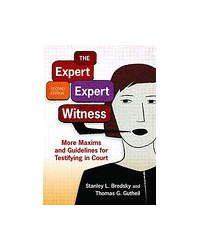“The Expert Expert Witness: More Maxims and Guidelines for Testifying in Court”

“The Expert Expert Witness: More Maxims and Guidelines for Testifying in Court”
By Stanley L. Brodsky and Thomas G. Gutheil
American Psychological Association
Washington, D.C., 2016
Guide about expert testimony is a ‘page turner’
Reviewed by James K. Luiselli, Ed.D., ABPP, BCBA-D
Stanley L. Brodsky and Thomas G. Gutheil are internationally renowned professionals in the area of forensic psychology and psychiatry, respectively. Both have written extensively about testifying in court, with many journal articles, chapters and separate books to their credit. Here, they have collaborated on a hugely successful practice guide for multidisciplinary mental health practitioners.
Why a book about expert testimony? Consider the authors’ rationale: “In everyday proceedings in which potential experts are called and qualified as experts, it is uncommon for persons with an M.D., Ph.D, MSW, or other advanced degree to fail to be qualified as experts – the core issue is how well they do on the stand.”
Expert status, then, is a role many mental health professionals may assume even though they lack experience with testimony.
In format, the book is organized around 51 short chapters (three to four pages), each one devoted to a single topic such as “Spontaneity and Alertness on the Stand” and “Personal Attacks: Demeaning Attorneys.”
The chapters define the topic, describe typical dialogue between the expert and attorneys and highlight key competencies. Each entry concludes with a one-sentence maxim “designed to capture the essence of the lesson in the chapter.”
Readers will recognize several dominant themes throughout the book. Notably, successful expert witnesses are thoroughly prepared before taking the stand, acknowledge their oratory strengths and weaknesses, stay within the bounds of competency and admit what they do not know and have not done. Honest and forthright self-appraisal is the characteristic Brodsky and Gutheil value most.
Although the book concentrates on expert testimony, the content transfers equally well to mental health professionals who function as a “fact witness.” For example, you may be called or receive a subpoena to testify about testing, therapy or other clinical services provided to a plaintiff or defendant.
Virtually the same expert testimony tactics apply in these cases.
The essence of this book comes from the extensive expertise of the authors, its practical focus, clear articulation and utility. Chapters are presented alphabetically by topic, making it easy to browse and select areas of interest. I recommend reading the entire book so that you do not miss any of the sage advice.
Another positive feature of the book is the “science” of testimony represented by research conducted during simulated and actual trials. There are, indeed, evidence-based practices that support the maxims Brodsky and Gutheil advocate.
With a topic as terse as expert testimony you might think that the book makes for tedious reading. Not so. Brodsky and Gutheil fill the chapters with humorous anecdotes, personal encounters and lively correspondence with colleagues, all of it keeping the pages turning.
To the authors’ credit, they end their book with the names of other texts and volumes concerning mental health testimony and performing successfully in court. Being familiar with and recommending many of these informative resources, I put “The Expert Expert Witness” at the top of this list.
James K. Luiselli, Ed.D., ABPP, BCBA-D, is Chief Clinical Officer, Clinical Solutions, Inc. and North East Educational and Developmental Support Center, Tewksbury, Mass..
Learn more about the book: The Expert Expert Witness: More Maxims and Guidelines for Testifying in Court
